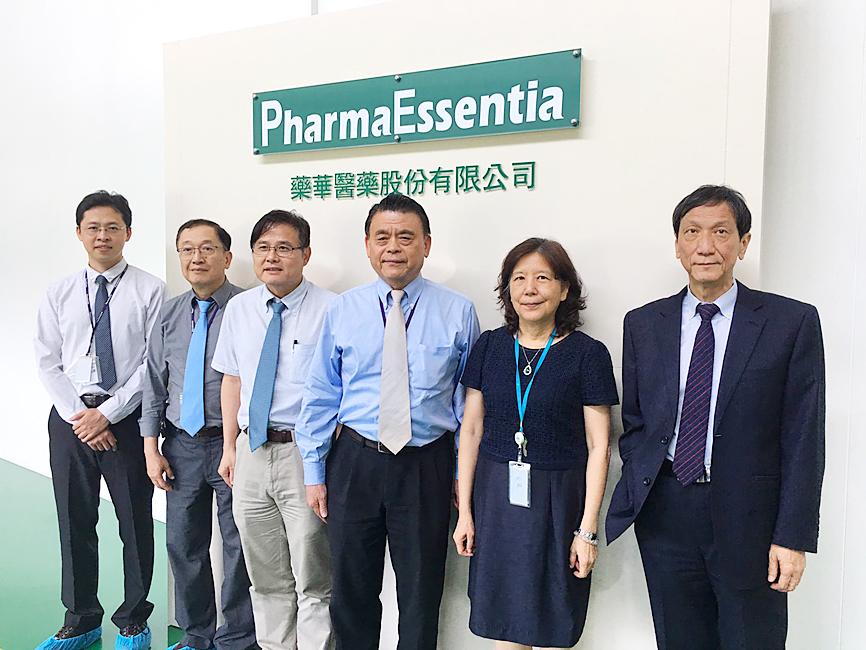PharmaEssentia Corp (藥華醫藥) shares have jumped 80.56 percent since the company obtained a US polycythemia vera (PV) drug license for its new interferon drug Besremi (ropeginterferon alfa-2b-njft) on Nov. 12.
Shares on Friday closed at NT$195 in Taipei trading, up from the stock’s closing price of NT$108 on Nov. 12.
PV is a rare, chronic and life-threatening blood cancer linked to a stem cell mutation in the bone marrow that results in an overproduction of blood cells and places sufferers at risk of having a blood clot, stroke or heart attack.

Photo: CNA
PharmaEssentia is preparing to make Besremi available in the US in the coming weeks, which is expected to contribute sales and earnings to the company going forward, Yuanta Securities Investment Consulting Co (元大投顧) said in a note on Thursday.
“Besremi is the first first-line PV drug approved by the US Food and Drug Administration (FDA), and can be used on any PV patients regardless of prior treatments,” Yuanta said. “We see a positive outlook for Besremi sales in the US going forward, despite that the new drug’s pricing of US$180,000 per person per year is higher than previously expected.”
In the US, the number of people with PV who are administered Besremi is projected to rise by 800 per year after the drug is launched there, with US sales of Besremi likely to reach US$100 million next year and increase by US$100 million every year after that, Yuanta said.
“Besremi might also cut into the sales of other first and second-line PV drugs, with an estimated revenue of US$900 million in the US in 2030,” it said.
PharmaEssentia last week reported revenue of NT$42.4 million (US$1.52 million) for last month, up 53.2 percent month-on-month and 10.65 percent year-on-year. Cumulative revenue in the first 10 months of the year totaled NT$318.9 million, an increase of 5.13 percent from last year.
With the new drug, the company has high hopes that its balance sheet will improve after posting losses per share of NT$4.74 in the first three quarters of the year, a company regulator filing showed.
In the US, Besremi has been designated an orphan drug for PV, and with the FDA’s approval, PharmaEssentia would have seven years of orphan drug exclusivity (ODE) in the US market.
Aside from the US, Besremi has received approval in Taiwan, the EU and South Korea for PV treatment, the company said.
The company has also recruited 87 people, more than half of the number it plans to recruit, for global clinical phase 3 trials of Besremi to treat essential thrombocythemia, it said.
PharmaEssentia expects to recruit all 160 participants needed for the trials by the second quarter of next year and to complete the trials in the middle of 2023, the company added.

CHIP WAR: Tariffs on Taiwanese chips would prompt companies to move their factories, but not necessarily to the US, unleashing a ‘global cross-sector tariff war’ US President Donald Trump would “shoot himself in the foot” if he follows through on his recent pledge to impose higher tariffs on Taiwanese and other foreign semiconductors entering the US, analysts said. Trump’s plans to raise tariffs on chips manufactured in Taiwan to as high as 100 percent would backfire, macroeconomist Henry Wu (吳嘉隆) said. He would “shoot himself in the foot,” Wu said on Saturday, as such economic measures would lead Taiwanese chip suppliers to pass on additional costs to their US clients and consumers, and ultimately cause another wave of inflation. Trump has claimed that Taiwan took up to

A start-up in Mexico is trying to help get a handle on one coastal city’s plastic waste problem by converting it into gasoline, diesel and other fuels. With less than 10 percent of the world’s plastics being recycled, Petgas’ idea is that rather than letting discarded plastic become waste, it can become productive again as fuel. Petgas developed a machine in the port city of Boca del Rio that uses pyrolysis, a thermodynamic process that heats plastics in the absence of oxygen, breaking it down to produce gasoline, diesel, kerosene, paraffin and coke. Petgas chief technology officer Carlos Parraguirre Diaz said that in

Japan intends to closely monitor the impact on its currency of US President Donald Trump’s new tariffs and is worried about the international fallout from the trade imposts, Japanese Minister of Finance Katsunobu Kato said. “We need to carefully see how the exchange rate and other factors will be affected and what form US monetary policy will take in the future,” Kato said yesterday in an interview with Fuji Television. Japan is very concerned about how the tariffs might impact the global economy, he added. Kato spoke as nations and firms brace for potential repercussions after Trump unleashed the first salvo of

SUPPORT: The government said it would help firms deal with supply disruptions, after Trump signed orders imposing tariffs of 25 percent on imports from Canada and Mexico The government pledged to help companies with operations in Mexico, such as iPhone assembler Hon Hai Precision Industry Co (鴻海精密), also known as Foxconn Technology Group (富士康科技集團), shift production lines and investment if needed to deal with higher US tariffs. The Ministry of Economic Affairs yesterday announced measures to help local firms cope with the US tariff increases on Canada, Mexico, China and other potential areas. The ministry said that it would establish an investment and trade service center in the US to help Taiwanese firms assess the investment environment in different US states, plan supply chain relocation strategies and